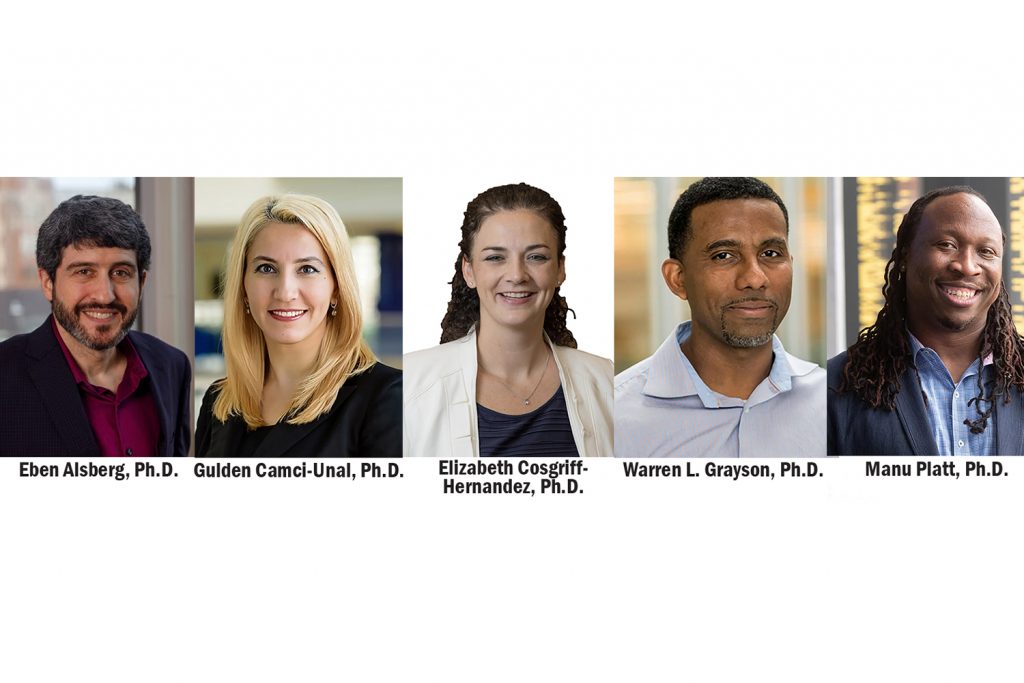The symposium, coordinated by ACS's Division of Polymeric Materials Science and Engineering, highlights the Regenerative Engineering Society, founded by UConn's Dr. Cato T. Laurencin.

Dr. Cato T. Laurencin at the Rock Star Symposium of Regenerative Engineering Symposium held at the American Chemical Society (ACS) Fall 2025 meeting (Photo Courtesy of the Cato T. Laurencin Institute).
The annual Rock Stars of Regenerative Engineering Symposium was held at the American Chemical Society (ACS) Fall 2025 conference in Washington, D.C. The symposium is coordinated by the ACS's Division of Polymeric Materials Science and Engineering (PMSE) and highlighted the Regenerative Engineering Society (RES), which was founded by Dr. Cato T. Laurencin, who also serves as president of the RES.
The mission of the RES is to promote and advance regenerative engineering. As part of this mission, RES organizes the annual Rock Stars of Regenerative Engineering Symposium, which brings together world-renowned regenerative engineers, scientists, and industry leaders to discuss cutting-edge research, the commercialization of regenerative engineering technologies, and the future of the field. The symposium features presentations from leading experts, as well as talks from Rising Stars-typically assistant professors-who showcase their innovative research.
This year's Rock Stars were Eben Alsberg, Ph.D., University of Illinois Chicago IC Distinguished Professor; Gulden Camci-Unal, Ph.D., Professor, Francis College of Engineering; Elizabeth Cosgriff-Hernandez, Ph.D., professor of biomedical engineering at the University of Texas at Austin; Warren L. Grayson, Ph.D., assistant professor of biomedical engineering at Johns Hopkins University School of Medicine; and Manu Platt, Ph.D., director, Center for Biomedical Engineering Technology Acceleration (BETA Center).
 UConn Professor Sir Cato T. Laurencin is the University Professor and Albert and Wilda Van Dusen Distinguished Endowed Professor of Orthopaedic Surgery at UConn School of Medicine, professor of Chemical Engineering, professor of Materials Science and Engineering, and professor of Biomedical Engineering at the University of Connecticut. He is the CEO of The Cato T. Laurencin Institute for Regenerative Engineering, a cross-university institute created and named in his honor at the University of Connecticut. He is the first individual to receive the American Association for Advancement of Science (AAAS) Mentor Award, the Beckman Award for Mentoring, and the Presidential Award for Excellence in Science, Math, and Engineering Mentoring bestowed by President Obama.
UConn Professor Sir Cato T. Laurencin is the University Professor and Albert and Wilda Van Dusen Distinguished Endowed Professor of Orthopaedic Surgery at UConn School of Medicine, professor of Chemical Engineering, professor of Materials Science and Engineering, and professor of Biomedical Engineering at the University of Connecticut. He is the CEO of The Cato T. Laurencin Institute for Regenerative Engineering, a cross-university institute created and named in his honor at the University of Connecticut. He is the first individual to receive the American Association for Advancement of Science (AAAS) Mentor Award, the Beckman Award for Mentoring, and the Presidential Award for Excellence in Science, Math, and Engineering Mentoring bestowed by President Obama.
Laurencin has created and established numerous programs in his career including the UConn Young Innovative Investigator Program, the UConn M-1 Program, the UConn Pre-K Program, the UConn NSF EFRI Regenerative Engineering REM and REU Programs, and the UConn NIH T32 Regenerative Engineering at the University of Connecticut alone. The UConn Foundation established the Cato T. Laurencin Scholars Award given to undergraduate students, while nationally, the Society for Biomaterials created the Cato T. Laurencin, M.D., Ph.D. Travel Award given to undergraduate students in Biomaterials Science.
Nationally, the Society for Biomaterials established the Cato T. Laurencin, M.D., Ph.D. Travelling Fellow Award Program for undergraduates in his honor. Laurencin received the 2023 Priestley Medal, the highest honor of the American Chemical Society and the Von Hippel Award, the highest honor of the Materials Research Society. He will receive the Dickson Prize for Medicine. Many of the Dickson Prize awardees have gone on to receive the Nobel Prize.
Sir Cato Laurencin was bestowed Knight Commander of the Order of St. Lucia, under the auspices of King Charles III of England. He is recognized as the leading international figure in polymeric biomaterials chemistry and engineering who has made extraordinary scientific contributions and has had profound contributions to improving human health.






